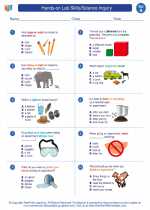Hands-on Lab Skills/Science Inquiry -> behavior
Behavior
Behavior refers to the way living organisms act and respond to their environment. It encompasses everything from simple reflex actions to complex patterns of social interaction.
Types of Behavior
There are several types of behavior exhibited by living organisms:
- Instinctive Behavior: This is innate behavior that an organism is born with. It does not need to be learned or practiced.
- Learned Behavior: This type of behavior is acquired through experience and practice. It can be modified over time.
- Social Behavior: This refers to how organisms interact with others of their own species. It includes behaviors such as mating, communication, and cooperation.
- Territorial Behavior: Some organisms exhibit behavior related to defending or marking their territory.
- Reproductive Behavior: This type of behavior is related to finding a mate and reproducing.
Factors Influencing Behavior
Several factors can influence an organism's behavior:
- Genetics: The genetic makeup of an organism can influence its behavior.
- Environment: The external surroundings and conditions can have a significant impact on behavior.
- Learning and Experience: An organism's past experiences and the ability to learn from them can shape its behavior.
- Social Interactions: The presence and behavior of other members of the species can impact an organism's behavior.
Study Guide
To understand behavior, it is important to consider the following:
- Observe and document different types of behavior in various organisms.
- Research the genetic and environmental factors that influence behavior in different species.
- Study the role of learning and experience in shaping behavior.
- Explore the impact of social interactions on behavior within a species.
- Consider the evolutionary significance of different types of behavior.
◂Science Worksheets and Study Guides First Grade. Hands-on Lab Skills/Science Inquiry
Study Guide Hands-on Lab Skills/Science Inquiry
Hands-on Lab Skills/Science Inquiry  Worksheet/Answer key
Worksheet/Answer key Hands-on Lab Skills/Science Inquiry
Hands-on Lab Skills/Science Inquiry  Worksheet/Answer key
Worksheet/Answer key Hands-on Lab Skills/Science Inquiry
Hands-on Lab Skills/Science Inquiry  Worksheet/Answer key
Worksheet/Answer key Hands-on Lab Skills/Science Inquiry
Hands-on Lab Skills/Science Inquiry  Vocabulary/Answer key
Vocabulary/Answer key Hands-on Lab Skills/Science Inquiry
Hands-on Lab Skills/Science Inquiry  Vocabulary/Answer key
Vocabulary/Answer key Hands-on Lab Skills/Science Inquiry
Hands-on Lab Skills/Science Inquiry 

 Worksheet/Answer key
Worksheet/Answer key
 Worksheet/Answer key
Worksheet/Answer key
 Worksheet/Answer key
Worksheet/Answer key
 Vocabulary/Answer key
Vocabulary/Answer key
 Vocabulary/Answer key
Vocabulary/Answer key

The resources above cover the following skills:
EARTH AND SPACE SCIENCE
Earth’s Place in the Universe
Observe seasonal patterns of sunrise and sunset to describe the relationship between the number of hours of daylight and the time of year (e.g., more hours of daylight during summer as compared to winter).